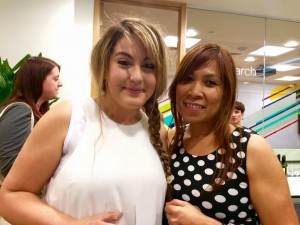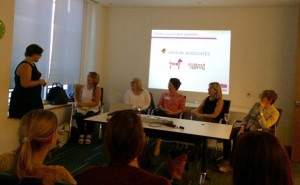By Betty Adamou
WIRe (Women in Research) event take-aways from last night’s ‘Cracking the Imposter Syndrome’ panel, by Betty Adamou.
Yesterday evening, I was kindly invited to speak on a panel about my personal experiences with the Imposter Syndrome, and apparently, I am not the only one who has this syndrome (or sometimes people call it a ‘fraud complex’).
Every woman on the panel, including our host, Elina Halonen, had stories to tell about their doubts on their successes, their fears of failure (and even their fears of more success), and their battles with feeling ‘undeserving’ to have a seat at the table. You wouldn’t expect some of the women on the panel to have ever felt like this. Confident women that I admire, who are all founders, company directors, business owners, all had their stories to tell.
Rosie Campbell, Director of Campbell Keegan, Gemma Stokes, Founder of Podengo, Sinead Hasson, Owner & Managing Director, Hasson Associates, Phyllis Macfarlane, Global Training Director, GfK (and former chairman of GfK as well as MRS chairman) all had memories to share of their times of self-doubt and dismissing their successes as ‘luck’.
Elina Halonen, partner at the Irrational Agency who organized the event, had some great questions for each of us that could only warrant truly honest responses. She asked us about a time we can recall feeling at our most ‘fraud’-like, and I shared a story about how I walked into a clients office when RTG was 7 months old (at this time I was working from my bedroom 4 years ago in a shared house) and I remember feeling more and more like a fraud the closer I got into my clients office after walking through what must have been acres of office space. I kept thinking “if she knew I worked from my bedroom, would I even be here??”.
Admittedly, the more time has passed and the more I have grown as a business owner, practitioner in my field, and now a new academic having taken on a PhD, the ‘imposter’ is now dwarfed (thankfully) by my sense of purpose and confidence. And this seemed to be a theme with all the women on the panel; the older and wiser they became, with more experiences under their belt, the better they felt about themselves and quashed the fraud complex.
One audience member had a great name for those little voices of self-doubt; she called it the ‘Shitty Committee’ (which needs to become a hashtag) and she spoke about how she would tell herself not to listen to the shitty committee who would shout ‘you’re not good enough’.
To counteract your own Shitty Committee and quash your feeling as an Imposter or Fraud, the panelists gave some great advice born from their own tried and tested ways of getting over the imposter syndrome. Here are 12 ‘to-do’s’ to help you:
- #1 Counteract the ‘Shitty Committee’ in your head with a ‘Awesome Committee’. Counteract every negative comment by reminding yourself what you’re good at and what you’ve achieved to-date. Make a note (by writing it down, updating your CV, going over the milestones you’ve achieved in the last year) of everything that makes you stand out. What makes you different to anyone else in the boardroom or office? Name your successes and own them. It is likely that all your successes didn’t happen ‘just by chance’.

Me and Febe: Febe used to be an incredibly supportive manager when we were both at Indiefield, a research agency in North London.
- #2 Remind yourself that everyone is different – man or woman. No one will ever be able to be you, therefore no one will be as unique as you. No one will have read the articles you’ve read, have the network you have, have the influences you have, the interests you have, with the passion you have, so your angle will always be different to everyone else’s. Learn how to articulate how you’re unique.
- #3 Not everyone knows everything all the time. You will have more respect from your peers by saying ‘I don’t know’ rather than scrambling for what you think might be the right answer. There is nothing wrong with not knowing everything!
- #4 Nab yourself a couple of solid mentors. I have three people that I can class as mentors and they are fantastic people, and each very different. I have leaned on them in times of self-doubt, they’ve helped me get out of dark mental holes, and they’ve been there to cheer-lead when times are fantastic and I’m on a high. Nab yourself a mentor or two, or three, so that you can learn from them and also lean on them at times when you feel on your own. You’re not on your own, and no doubt your mentors will have felt the same as you at some point. One of my mentors says she really has the Imposter Syndrome, which blows my mind considering how supportive she has been of me, but what this has taught me is that sharing experiences and having that sense of relatedness really does help. At the very least, it reminds us we’re not crazy.
- #5 Be a mentor. One of the most selfless things you can do is give your time to others. By being a mentor to someone else, not only can you share your experiences and inspire others, but this is also a fantastic way of quietening your inner fraud. And finding a mentee doesn’t necessarily have to be someone in your industry. Is there someone in your family who could do with some advice? Got a friend who is embarking on new experiences that is well-trodden ground for you? There you go, instant mentee. Incidentally, WIRe offer a mentorship programme – check it out here.
- #6 Stop being so hard on yourself. Yes, ok, this is easier said than done. With stories about overnight successess filling our news feed, and everyone seeming to work harder and better than you, it can be hard to stop being your own worst critic and push yourself over the edge. Work smart, not just work hard. Balance your life. Don’t put off until tomorrow what you can do today, but at the same time, remember that work isn’t everything.
- #7 Find a supportive partner. This one is an interesting one. Having a partner who is scared of your ambition, or tries to dampen it, is poisonous. And this type of person may not even be a partner, but a friend or family member. The advice from the panel was a stern ‘get rid’ – no good can come from sharing your hopes, dreams and successes with someone who wants to knock them down. Surround yourself with friends, family and a partner who are rooting for you.
- #8 If you’re not confident, ‘fake it until you make it’. If you have to do something outside of your comfort zone, like present at a conference, manage a project or host a client meeting, and don’t feel confident enough to do it, watch what other confident people do. Watch how they project their voices, use their hands, even how they stand. I watched a couple of TED talk videos on how to present on a stage, and I found it very useful. So I followed the ‘codes’ of looking confident in order to then naturally behave this way and become confident from the inside.
- #9 Dress in a way that makes you feel confident. Yes, this seems a bit of a frivolous piece of advice, but as per the panel last night, the way we dress can really impact our levels of confidence. There are so many combinations of dress for women, and of course it’s important to dress appropriately for the occasion and audience we are with. I spoke about how I went from wearing t-shirts and hoodies at home, to buying dresses and suit jackets to wear when speaking at conferences, and felt like I was wearing a really uncomfortable costume. I felt like my clothes were wearing me, not the other way around. Now I have a work wardrobe that feels much more like me, in my style, and I feel much more comfortable so I can focus on the content of what I need to say, not worried about how I look or how uncomfortable I am!
- #10 Know your shit. We said earlier that we don’t know everything, and that’s ok, but learn what you need to learn because saying ‘I don’t know’ won’t cut it forever. Elina, our hostess last night, asked me how I responded to critics when I first started up RTG and introduced ‘ResearchGames’ for the first time. I told her honestly that in the beginning, yes, there was a lot I didn’t know, but I had passion, and I had ideas which interested people. However, we are indeed in an intellectual industry that demands research rigour, so in the last four years I have read more academic work than I probably did the whole time I was at Uni, and I started my PhD directly related to my field. I’ve also written articles and papers, taught others about my work and shared my work at conferences – all this has lead me to be objective about my work, give myself chances to be asked different questions and then go away to find the answer. It is absolutely important, as a researcher of any type, to dedicate some of your time to learning and where possible, to teaching. I now have an arsenal of research rigour, case-studies and academia behind me to share with people, whether they are critics or ‘believers’ or somewhere in-between. And not only did this help the ‘critics’ understand more about the methodology of ResearchGames, but it made my inner imposter go from a shouting inner-voice to nothing but a whisper.
- #11 Let go. No one is perfect, surprise surprise! So if you’ve made any ‘mistakes’, learn from them, and move on. We hear it all the time – ‘don’t be afraid to fail’, and it is true. I went to a talk a few nights ago where Director and Producer, Darryl Daniel, said ‘no good ever came out of staying in your comfort zone’. So true. We have to fall over a few times before we can run like the wind.
- #12 Be a good person. Last night, there was some discussion about women supporting women and that in itself could have been a whole other event, as a lot of attendees seemed to have questions and stories about what to do in the event that women at work (usually in positions of authority or ‘competition’) are not very supportive. There was discussion around the notion that women should be ‘aggressive’ in order to be authoritative. When I heard this I was shocked, and sad, that some people are saying these things. No one needs to be aggressive, or shitty, to anyone at any time. Be a good person. Be supportive of others. Be kind. Be happy at other people’s successes (otherwise how can you expect them to be happy at your own successes??). Don’t say things you don’t mean. Be firm but fair (which also translates to “don’t be a doormat”). Man or woman, from any culture, ‘class’ or background, this advice applies to you. Just Be A Good person.
Got any advice you would like to share about building confidence and squashing self-doubt? Got any tried and tested tips for getting over the Imposter Syndrome? Share them with us and help others.
PS. A MASSIVE thank-you to all the women on the panel who came to share their stories, to Elina Halonen for doing an amazing job at organising the event, and to all the people who came to listen, share their experiences as well, and ask great questions. And thank you to WIRe – these events are so important to our industry so thank you for keeping them going!


